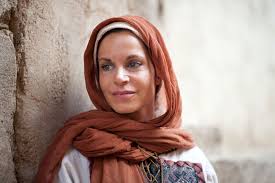Salome, Mother of the Zebedees
Her name means: “Peace”
Her character: A devoted follower of Yeshua (Jesus), whose husband ran a fishing business, she shared the common misconception that the Messiah would drive out the Romans and establish a literal kingdom in Palestine. Her name was probably Salome.
Her sorrow: To have stood with other women at the cross, witnessing the death of Yeshua of Nazareth.
Her joy: To have seen an angel at Messiah’s tomb, who proclaimed the resurrection.
Key Scriptures: Matthew 20:20-24; 27:56; Mark 15:40-41; 16:1-2
Her Story
Salome loved Yeshua nearly as much as she loved her own two sons, James and John. She would never forget the day they left their father and their fishing nets to follow him. Lately, she, too. had come to believe that Yeshua was the Messiah of God.
She had smiled when she heard Yeshua had nicknamed her boys “the Sons of Thunder.” Surely he had recognized the seeds of greatness in the two feisty brothers from Capernaum. Why else would he have invited them into his inner circle, along with Simon Peter? She had heard how Yeshua had led the three up a high mountain. When they came down, her garrulous sons could hardly speak. But then the story came out. “Yeshua’ face was blindingly bright like the sun…. “Moses and Elijah appeared and spoke with him…. “Suddenly a cloud surrounded us and a voice from heaven said, ‘This is my Son, whom I love; with him I am well pleased. Listen to him!’ Salome had listened. She had seen the glory and the power that radiated from the man. Though she had heard ominous rumors that Jerusalem’s men of power hated Yeshua, she also knew that the great King David had faced his own share of enemies before establishing his kingdom. And hadn’t Yeshua promised his disciples that they would sit on twelve thrones in his kingdom? “Everyone who has left houses or brothers or sisters or father or mother or children or fields for my sake,” he had said, “will receive a hundred times as much and will inherit eternal life.” How could she doubt him? Even with faith as small as a mustard seed, mountains could be moved. Salome had left behind her comfortable home on the northwest shore of Galilee to join her sons. Now, as they journeyed up to Jerusalem, she remembered other words Yeshua had spoken: “Ask and it will be given to you; seek and you will find; knock and the door will be opened to you.” She would no longer deny herself the one favor her heart desired. Prostrating herself before him, she begged, “Grant that one of these two sons of mine may sit at your right and the other at your left in your kingdom.” But instead of replying to her, Yeshua turned to James and John and said, “You don’t know what you are asking. Can you drink the cup I am going to drink?” “We can,” they answered. Yeshua said to them, “You will indeed drink from my cup, but to sit at my right or left is not for me to grant. These places belong to those for whom they have been prepared by my Father.” Yeshua, who knew Zebedee’s sons better than anyone, realized that Salome was only voicing their rising ambitions. Like any loving mother, she had simply asked for what she thought would make her children happy. But as Yeshua’ reply and subsequent events proved, this mother didn’t begin to comprehend what she was asking. Soon, the man she had approached as a king would himself die on a cross, and she would be one of the women witnessing his death.
After it was over, Salome may have remembered the anguished faces of the men who had been crucified with Yeshua, one on his right hand and the other on his left—an ironic reminder of her request on the way up to Jerusalem. Such a memory would only have increased her terror for what might now happen to her sons. Along with other faithful women at the cross, Salome was present on the morning of Yeshua’ resurrection. Surely the angel’s words—”He has risen! He is not here!”—would have comforted her later in life when her son James became the first martyred apostle, dying at the hands of Herod Agrippa. Instead of asking Yeshua what he wanted for her sons, Salome acted as though she knew exactly what he needed to do on their behalf. She must have forgotten that Yeshua had exhorted his followers to leave behind not only houses, brothers and sisters, fathers and mothers for his sake, but also children. In Salome’s case, it didn’t mean turning her back on her children but surrendering them to God. It meant putting Yeshua above everything and everyone, loving him better than her own sons. Only then would she understand the meaning of what they would suffer as followers of Messiah. Only then would she really know how to pray.
Her Promise
Though the typical woman in biblical times was in a subservient role, her position as a mother is exalted by Scripture. God the Father recognized from the very beginning the important role a mother would play in her children’s lives, and he promised to bless her. Those same promises apply to you today.


0 Comments